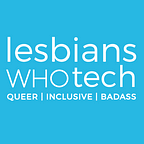A Software Dev Student’s First Hackathon
by Loraine Kanervisto, @lorainekv
It’s not every day that your team is asked to build tools to protect the rights of youth worldwide. Yet that’s exactly the sort of opportunity we were given as attendees at the Lesbians Who Tech UNICEF/Bloomberg Hackathon. Dozens of us filled a conference area in the Bloomberg Tower, located in Midtown Manhattan.
Getting into Bloomberg for the hackathon itself felt like we were adventuring into some sort of futuristic, sci-fi nightclub citadel — we journeyed up the soaring glass structure in elevators that glowed with blue and purple lights, and we roamed through halls lined with sharply-dressed corporate security guards.
We arrived in the hackathon lobby and found heaps of breakfast food and tanks of coffee. Coder, educator, and social justice champion Aliya Rahman greeted us as the host of the hackathon. I immediately knew that this was gonna be an incredible experience, since I had just seen Rahman in the film, CODE: Debugging the Gender Gap,” and watched her Summit presentation, “Desegregation in the Age of ‘Innovation’.”
I knew that I could trust Rahman help us maintain a socially-responsible compass throughout this hackathon.
Me as a blank slate
So I actually knew very little about the hackathon before I jumped on an airplane to fly from Seattle to NYC. The full agenda details hadn’t been posted, and one of the summit correspondences from Leanne instructed me to just bring “my experience.”
Honestly, I was kinda freaking out. I’m a software dev student attending Ada Developers Academy and transitioning into a tech career at 27. I had absolutely no idea what to expect. I didn’t want to prep with research on “traditional” hackathons, because the entire culture and climate would be totally different.
I knew I could count on the LWT hackathon being a space welcoming to:
- folks of various intersectional backgrounds
- folks coming from non-tech backgrounds
- new devs like me
I did read up on Liz Rush’s recap of the LWT Summit Hackathon in San Francisco last year, and it was encouraging to know that a graduate from Ada Developers Academy had already had a very positive experience in this space. So off I went.
Tackling real-world issues
After breakfast, UNICEF representatives debriefed us on the challenges we’d be working on. They fell into four main categories:
- Analyzing the Voices of Youth blog posts to find trends of challenges and risks that youth face. Determine whether progress is aligned with UNICEF’s mission.
- Collecting identification and location data on the youth served by UNICEF
- Mining social media to learn more about the challenges faced by Syrian refugee and Panama youth, as they are affected by new child protection legislation
- A workflow for UNICEF contractor onboarding processes
Dozens of us were in attendance, and we were asked to group up based on our project interest. I selected the Voices of Youth blog posts, since I’m interested in Natural Language Processing.
Our group was still quite large, so we organized into sub-teams for design, development, and data visualization. Some folks stepped away for a short time to attend an Intro to Git breakout session.
The design team would identify the keywords and contexts necessary to highlight issues and successes discussed in youth blog posts. Thacher had some incredible ideas involving Tableau tools and rallied a team around data visualization. This would enable UNICEF to create clear visual reports of blog keyword trends. I joined the development team to create an app that would quickly clean and parse the blog posts into a format that could be analyzed.
Parse The Voices
Several folks had previous experience with Ruby on Rails, so developers Kara Carrell and Nadia Bajwa paved the way forward by starting a Rails app and a parse-the-voices Github repository. The dev team quickly identified key challenges with the 11,000 blog posts given to us by UNICEF, including:
- HTML tags mixed in with the blog content
- blog spam
- posts that seemed like they were written by adult staff or volunteers, rather than youth
- inconsistent authorship identifiers and post categorizations
We crafted a plan of action that involved cleaning up the data and seeding the blog posts into a postgres database for future language analysis.
For the duration of the hackathon, I mostly collaborated with Kara, Nadia, Moira Hardek (a great liaison between the design and dev teams), and Blaire (database extraordinaire). A few of us talked about how amazing it was to work on a dev team comprised mostly of queer POC. We stuffed ourselves on fancy Bloomberg snacks (those double-chocolate éclairs!), and we didn’t forget to have fun.
Presentation time!
By the end of the seven-hour hackathon, each group had just five minutes to present our accomplishments and a game plan for UNICEF to move forward. Our Voices of Youth team put together a presentation on the data challenges we faced, the types of keyword phrases we’d look out for, how an app could parse the data, and how to build meaningful reports with Thacher’s Tableau visualizations.
It was thrilling to work with such bright folks from various disciplines on this project — I think that our varied backgrounds really enabled us to come up with some creative solutions.
I walked away from my first hackathon with a greater feeling of confidence in my own skills, awe at what we’d been able to accomplish in a single day, and the names of many folks I’d love to collaborate with in the future!
